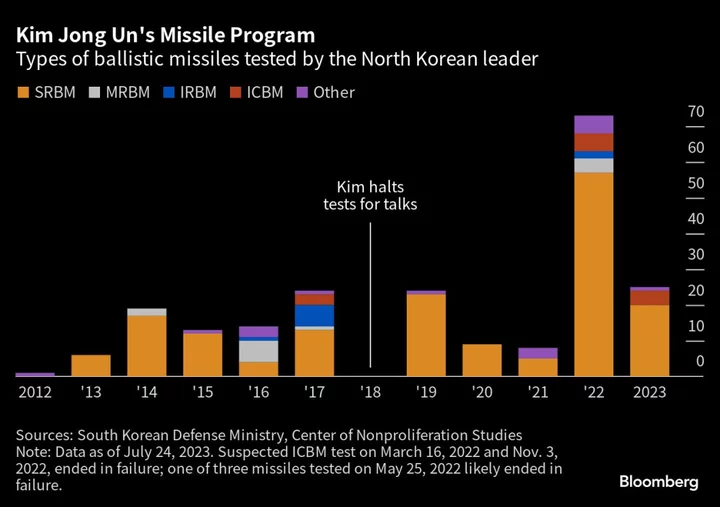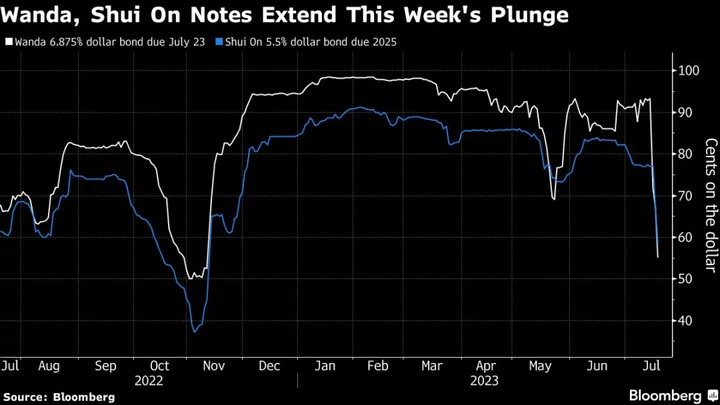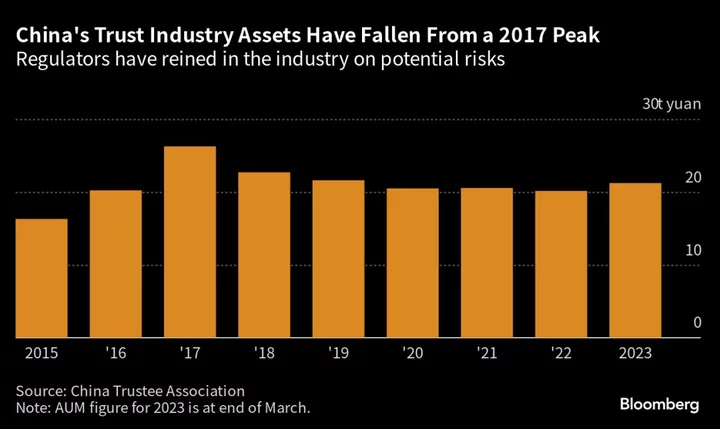South Korean President Yoon Suk Yeol said the world would never accept North Korea as a nuclear weapons power while opening the door to a possible breakthrough in cooperation on deterrence with the US and Japan when leaders from the nations meet in a landmark summit later this week.
Yoon expects the summit with Prime Minister Fumio Kishida and President Joe Biden will lead to agreement on ways to enhance their capabilities to respond to the nuclear and missile threats from North Korea, he said in a written interview with Bloomberg News before leaving for the Friday meeting at the Camp David presidential retreat in rural Maryland.
“The complete denuclearization of North Korea is a clear and consistent goal of the international community, including the Republic of Korea and the United States,” Yoon said. “The international community will never accept North Korea as a nuclear power under any circumstances.”
Three-way talks on what is known as extended deterrence — a force strong enough that it convinces an adversary it can’t achieve its military and political goals through aggression — would mark a new chapter in ties among the three and help the Biden administration as it tries to manage threats posed by the likes of North Korea.
At a summit in April at the White House, Yoon and Biden agreed on enhancing the deployment of military assets such as nuclear-missile submarines near South Korea and set up a Nuclear Consultative Group that gives Seoul a greater say in how Washington deploys its nuclear umbrella of protection.
Read: Six Takeaways from White House Visit by South Korea’s Yoon
“Regarding extended deterrence, we are also open to separate consultations among the Republic of Korea, the United States and Japan,” Yoon said, referring to his country by its formal name. Japan and the US set up a regular bilateral dialogue for extended deterrence in 2010, Japan’s Foreign Ministry said.
The three sides held military talks in April and discussed items such as regular drills to track submarines and defend against missiles as ways to deter North Korea.
Lim Eul-chul, a professor at Kyungnam University’s Institute for Far Eastern Studies in Seoul, said by making talks on extended deterrence more formal, the process could be something like a mini-NATO aimed at keeping Beijing and Pyongyang in check.
China’s state-owned Global Times said the summit was targeting Beijing and adds to the drumbeat of “a new Cold War.” The foreign ministry said Tuesday that China opposes to the countries forming “small cliques” and is against actions that are confrontational.
While Yoon’s government has welcomed the arrival of the USS Kentucky, the first ballistic missile submarine to arrive at a port in South Korea in about four decades, the Japanese public is far more apprehensive about such displays due to the country being attacked with nuclear weapons at the end of World War II.
North Korea has denounced the Nuclear Consultative Group, which met for the first time in July, as a “nuclear war tool.” It demanded the end of submarine deployments and rejected requests from the US and South Korea to return to long-stalled nuclear disarmament talks. China has slammed bringing US submarines near the Korean Peninsula, saying this undermines the global nuclear nonproliferation regime.
There will be discussions at the Camp David meeting on ways to step up trilateral defense exercises, Yoon said. Within this year, the three intend to operationalize their sharing of missile warning data on North Korea in real time as agreed upon at a summit last November.
North Korea leader Kim Jong Un has rolled out a new array of nuclear capable missiles designed to deploy quickly and evade US-operated interceptors in the region. The missiles could hit all of South Korea in a manner of minutes and most of Japan in less than 15 minutes from launch, underscoring the importance of real-time data sharing to prepare counter-measures.
The international community, including South Korea, the US and Japan, will strictly and thoroughly implement United Nations Security Council resolutions that impose sanctions on North Korea, Yoon said. Capabilities will be channeled into blocking Kim’s illegal cyber activities that finance his development of weapons of mass destruction.
“We must make the North realize that its persistent and illegal nuclear and missile development will inevitably come at a cost and will only deepen its regime’s isolation and crises,” Yoon said.
Here are some other highlights from the interview.
When asked about the best ways for South Korea, Japan and the US to de-risk global supply chains from China for items such as semiconductors and batteries, Yoon responded:
- “We plan to discuss concrete ways to strengthen cooperation, including sharing information on the three countries’ supply chains and establishing an EWS (Early Warning System).
When asked about the most prudent path for South Korea in the wake of some US partners like Japan and the Netherlands joining the Biden administration’s initiatives to curb exports of some crucial materials to China:
- “The Republic of Korea, as a responsible member of the international community, is also actively participating in global discussions on export controls to maintain world peace and security. We plan to continue to consult closely with major countries on the operation of export control systems.”
When asked what he would like to see from the meeting in terms of economic cooperation:
- “First, we plan to further solidify the framework for our cooperation to strengthen the resilience of supply chains. Also, we will conduct joint research and enhance cooperation in AI, quantum, space and other key critical and emerging technologies, which will become future growth engines, and we will work together to set global standards.”
--With assistance from Emily Yamamoto, Colum Murphy, Shinhye Kang and Isabel Reynolds.









